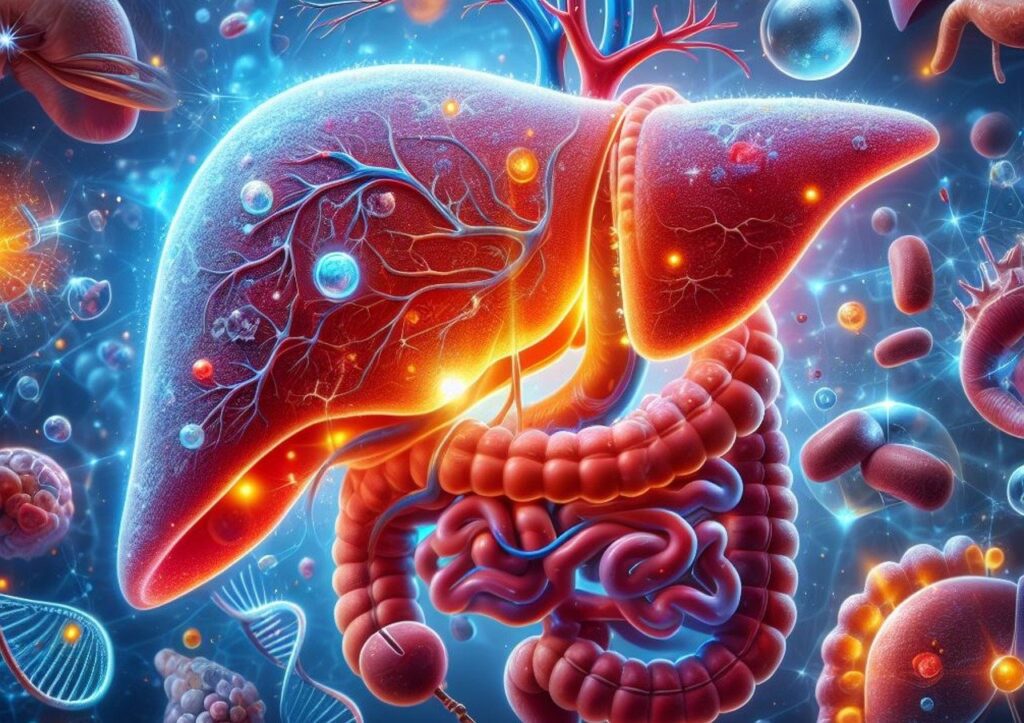This Post Contains Affiliate Links. Please Read Our Disclosure for Full Information.
So here’s something nobody really talks about at dinner parties: your liver is basically working overtime 24/7, and most of us are completely clueless about it. I mean, we obsess over our hearts, worry about our skin, but our liver? Poor thing’s been silently dealing with everything from that glass of wine last night to the processed lunch you grabbed on the go.

I’ll be honest – I never gave my liver much thought until I started feeling… off. You know that feeling when you’re not sick exactly, but something just isn’t right? That was me for months before I realized my body was basically waving red flags trying to tell me my liver needed some serious TLC.
Here’s the thing about your liver: it’s incredibly resilient, but it’s also really good at suffering in silence. By the time most people realize there’s a problem, their liver has been struggling for a while. So let’s talk about the warning signs I wish someone had told me about earlier.
1. You’re Exhausted All The Time (And Coffee Isn’t Helping)
This was my first clue, though I ignored it for way too long. I’m talking about that bone-deep exhaustion that doesn’t get better with sleep. You know, when you wake up feeling like you never went to bed in the first place.
When your liver is overloaded with toxins, it can’t efficiently convert nutrients into energy. It’s like having a clogged filter in your car – everything just runs sluggishly. I used to think I just needed more caffeine, but turns out my liver was basically drowning in the work it was trying to do.
What helped me was supporting my liver’s natural detox processes. I started with a liver support supplement with milk thistle after my doctor mentioned milk thistle has been used for liver health for centuries. I also picked up a high-quality B-complex vitamin since B vitamins are crucial for energy metabolism.

2. Your Skin Looks Like It’s Given Up
Your skin is basically a mirror for what’s happening inside your body, and when your liver can’t process toxins efficiently, your skin tries to pick up the slack. Not fun.
I started noticing weird things: my skin looked dull no matter how much moisturizer I slathered on, I was breaking out in places I never used to, and I had this weird yellowy tint that no amount of concealer could fix. Turns out, when your liver is struggling, toxins literally try to exit through your skin.
The yellowing thing? That’s actually a condition called jaundice, and it happens when bilirubin (a waste product your liver should be processing) builds up in your system. If you’re noticing a yellow tint to your skin or the whites of your eyes, please don’t wait – go see a doctor.
Supporting my skin from the inside out made a huge difference. I added a turmeric supplement with black pepper to my routine (the black pepper helps with absorption) and started using a gentle detox face mask once a week.
3. Your Digestive System is Staging a Revolt
This one’s not pretty to talk about, but we’re all adults here. When your liver isn’t producing enough bile or the bile isn’t flowing properly, your digestion goes haywire.
I’m talking about bloating that makes you look six months pregnant, constipation that’s frankly concerning, and heartburn that no amount of antacids seemed to touch. Sometimes I’d feel nauseous for no apparent reason, especially after eating fatty foods.
Your liver produces bile, which is essential for breaking down fats. When that system isn’t working properly, everything from absorption to elimination gets messed up. I learned this the hard way after months of thinking I just had a “sensitive stomach.”
What turned things around for me was adding digestive enzymes to help my body break down food more efficiently, and dandelion root tea which traditionally supports bile flow. I also invested in a high-quality probiotic to help rebalance my gut health.

4. You Can’t Handle Your Usual Glass of Wine
This was actually what made me realize something was really wrong. I used to be able to have a glass of wine with dinner and feel fine. Suddenly, even half a glass would leave me feeling awful the next day – headachy, nauseous, and just generally terrible.
Your liver processes alcohol, breaking it down so your body can eliminate it. When your liver is already overwhelmed with other toxins, adding alcohol is like asking someone who’s already carrying a huge load to pick up more weight. It just can’t handle it efficiently.
I also noticed that I was more sensitive to medications and even supplements. Things that never bothered me before suddenly gave me side effects. This makes sense because your liver is responsible for metabolizing most of what you consume.
If you’re noticing increased sensitivity to alcohol, medications, or even certain foods, your liver might be trying to tell you something. I had to completely cut out alcohol for a few months while I focused on liver support, and honestly, it made a huge difference.
5. Your Emotions are All Over the Place
This might sound weird, but traditional Chinese medicine has always connected liver health with emotional well-being, and there might be something to it. When I was dealing with liver issues, I was irritable, anxious, and just generally not myself.
Part of this is probably because when you don’t feel physically well, it affects your mental state. But there’s also some research suggesting that liver dysfunction can affect neurotransmitter balance, which directly impacts mood.
I was snapping at people over tiny things, feeling overwhelmed by normal daily tasks, and having trouble sleeping. My usual stress management techniques weren’t working, and I felt like I was constantly on edge.
Supporting my liver health definitely helped with the emotional stuff too. I added magnesium glycinate for better sleep and stress support, and started using adaptogenic herbs like ashwagandha to help my body handle stress better.

6. You’re Gaining Weight and Nothing Seems to Help
This one was particularly frustrating. I was doing everything “right” – eating well, exercising regularly – but the scale kept creeping up, especially around my midsection.
When your liver isn’t functioning optimally, it affects your metabolism and how your body processes and stores fat. Your liver is crucial for metabolizing fats and regulating blood sugar, so when it’s struggling, weight gain is often one of the first visible signs.
I also noticed that I was craving sugar and carbs more than usual, which makes sense because when your liver can’t regulate blood sugar properly, your body tries to get quick energy from simple carbs.
What helped was focusing on liver-supportive foods and supplements. I added green tea extract for its antioxidant properties and started drinking organic green tea throughout the day. I also made sure to get enough omega-3 fatty acids to support overall liver function.

7. Your Sleep is Completely Messed Up
This was probably the most disruptive symptom for me. I’d be exhausted during the day but then lie awake at night, mind racing, unable to fall asleep. Or I’d fall asleep fine but wake up at 3 AM feeling wired and unable to get back to sleep.
In traditional medicine, they say the liver does most of its detox work between 1-3 AM. If your liver is overloaded, it might be working extra hard during those hours, which can disrupt your sleep cycle. I don’t know if that’s scientifically proven, but the timing was definitely suspicious.
Poor sleep then made everything else worse – I was more tired during the day, more emotionally reactive, and my digestive issues got worse. It was a vicious cycle.
Getting my liver health back on track definitely improved my sleep. I also added melatonin to help reset my sleep cycle and made sure to have chamomile tea before bed to help me relax.
What I Wish I’d Known Earlier
Look, I’m not a doctor, and I’m definitely not trying to diagnose anyone over the internet. But what I learned from my experience is that our livers are incredibly important and often overlooked until there’s a real problem.
If you’re experiencing several of these symptoms, it’s worth talking to your healthcare provider. Blood tests can check liver function, and there are lots of ways to support liver health naturally.
The biggest game-changer for me was realizing that liver health isn’t just about avoiding alcohol – it’s about supporting your body’s natural detox processes through nutrition, supplements, stress management, and lifestyle changes.
I also learned that liver support isn’t a quick fix. It took months of consistent effort to feel like myself again, but it was absolutely worth it. These days, I’m much more conscious about what I put in my body and how I can support my liver’s incredible work.
Remember: This information is for educational purposes only and shouldn’t replace professional medical advice. If you’re concerned about liver health, please consult with a healthcare provider.
We are giving it for free to our users
Get 7 Free Digital Planner
The Bundle Includes -
Daily Planner, Weekly Planner, Monthly Planner, Self Care Planner, Daily Reflection, Goal and Habit Tracker, Gratitude Journal and Budget Tracker

